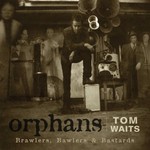Orphans: Brawlers, Bawlers & Bastards
Studio Album by Tom Waits released in 2006Orphans: Brawlers, Bawlers & Bastards review
Orphans: Brawlers, Bawlers & Bastards offers 30 brand new songs and 24 rarities
Tom Waits proves to be one of the most prolific rock performers in music history. It will take much time and effort if one decides to listen to all his official albums. His career is a great musical journey no one else, with the possible exception of Bob Dylan or Rod Stewart, has taken before. This year Tom Waits decided to make a surprise to all his fans. His new album Orphans: Brawlers, Bawlers & Bastards is not only a set of a new songs but also a peculiar report of many years of his music activities, which, along with the Waits’ diverse talents displays his incredible capacity for work. These are actually three albums, each with a separate name and function, which together make up one very powerful entity. Among the 56 songs represented here – 30 tracks are brand new, or new versions of old abandoned songs and 24 are rarities, stage and screen songs, collaborations and covers. During his entire career Tom Waits was always showing his love to pretty contradictory styles in his songs. So it made sense to trisect his material on this album to create a disc for each faction of Waits' diverse audience: Brawlers for rock, Bawlers for ballads and Bastards for experiments.
The album is stylistically divided into three parts
Brawlers presents probably the best-known of Tom Waits' personalities, filled with coarse vocals, old-time arrangements, fuzz buzz lead guitar and Americana cliché images: trains, jailhouses, bars etc. The greatest song on this disc, one of Waits' finest, is a cover of Philip Baptiste's Sea Of Love. The song, which concerns New Orleans, was originally recorded in 1988 for a film with the same name, but now it has an extra poignancy because of recent events. Another notable track is the season's most timely and topical political blues song Road To Peace. The second disc, Bawlers, evokes a sense of bitter romanticism, the thoughts of a cynic seeing things through rose-colored glasses. It's made up of eerie ballads, love songs and tragedies. A nice example that comprises all this is sentimental song If I Have To Go. However, there are some life-asserting pieces too, such as Never Let Go and You Can Never Hold Back Spring, where an indomitable human spirit reins the truth. The third set, Bastards, is the most fascinating. Waits growls, barks, narrates and improvise on the totally different subjects. There may be nothing else on these three discs as striking as Dog Door, his collaboration with Sparklehorse that traps Waits' repertoire of voices in a blend of synths and tape loops, a thrilling modern item based on his familiar songwriting formula.
The link between the album’s parts is Waits’ voice
Ultimately, the epicenter of Orphans: Brawlers, Bawlers & Bastards is Waits' voice. Having a unique expressiveness and great number of tiny nuances, it plays a new role every time. Waits embodies the entire genealogical line of the blues, jazz, local barroom bards, and traveling minstrels in the very grain of his songs. His voice carries not only the songs he and his songwriting partner and wife, Kathleen Brennan, compose, but also the magnet for the sonic atmospheres that frame it. And it is that voice that links all three of these discs together. Waits has enough of boldness to experiment with the modern sounds. Even though some of these songs have appeared elsewhere, Orphans: Brawlers, Bawlers & Bastards endows the old and new ones with the sound and texture of the present to offer them as something utterly new beyond anything Waits has previously released. And this very boldness and striving for experiments made it possible to issue that rarity of an album that will satisfy his fans as well as the uninitiated listeners. Orphans: Brawlers, Bawlers & Bastards is the best summery of Tom Waits that offers testimony of his unique talents without recycling any of his previous albums material.

